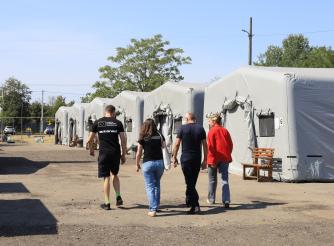“We were hungry and terrified by the intensity of the bombing”: Women fleeing northern Gaza tell of horrific conditions and harrowing journeys as siege enters its third month

Women fleeing northern Gaza with their families have told ActionAid of spending weeks trapped and hungry amid constant shelling, as the Israeli military’s brutal siege of the area enters its third month.
More than 2,700 people have been killed and over 10,000 injured in northern Gaza since the Israeli military launched its ground invasion there on October 6, ordering the forced displacement of residents. Since then, virtually no aid has entered the area, leaving tens of thousands of people without food, water, fuel, transport and electricity. Starvation and malnutrition are rapidly increasing, the Famine Review Committee has said, warning that the threshold for famine may have already been crossed.
Lamis, a pregnant mother, told ActionAid she and her family were trapped in a school in northern Gaza for two weeks before they were forced to flee. She said:
“We were besieged in a school for 14 days under fire and airstrikes. We could not move, and we couldn’t [even] go to the bathroom.
“The [Israeli army] started calling [out] on the loudspeaker [telling us] to evacuate the place. My children, my husband and I ran out. My husband was arrested and taken with the young men. I took my children and we started running. My children were screaming and were scared and cold.”
Farah, a mother, was trapped in the north with her family without food and water. She told ActionAid: “[The Israeli army] did not allow us to leave or [move]. [They did not allow us to get] food or drink. We were hungry. Then they arrested my son and my husband.
“After that, they took us out under the bombing, shells, and gunfire. We left in great panic. Despite our hunger, they did not allow us to take a mattress, or food. They did not even allow us to take water. We had children with us and my daughter-in-law was pregnant. We ran while the bombing was on us and there was no transportation...We were terrified by the intensity of the bombing.”
Displaced to Gaza City with no belongings and nowhere to live, Farah and her family were forced to sleep out in the open, exposed to the cold, until they could find shelter. Farah continued: “We stayed for two days and two nights without shelter, we were in the streets. We could not eat or feed our children in this cold, and it was freezing. [We had] no blanket and no mattress, so we stayed next to the walls until we found a shelter.”
More than 130,000 people have been forced to flee northern Gaza over the last two months, mostly to Gaza City, where the population has surged by around 50% in recent weeks and there is an urgent need for shelter, food and other essentials amid severe overcrowding. Up to 70% of those in some displacement sites women and children, according to UNFPA, many of whom are being forced to shelter in abandoned buildings or out in the open in the cold and rain.
ActionAid’s partner in Gaza, the Palestinian Development Women Studies Association (PDWSA), is currently providing psychological support to displaced women and girls in Gaza City. Despite delays caused by high prices on the market and the lack of aid getting in, staff are also planning to distribute hot meals, food parcels, hygiene kits and winter kits containing warm clothes and blankets to people in the coming days and weeks.
Up to 75,000 people remain in the north of Gaza, including staff and patients at ActionAid’s partner Al-Awda Hospital, where doctors are continuing to save lives and deliver babies amid unimaginable danger and despite running desperately low on fuel and medical supplies.
Riham Jafari, Advocacy and Communications Coordinator at ActionAid Palestine, says:
“The situation in northern Gaza is utterly nightmarish: it is being isolated and wiped out before our eyes. Tens of thousands of people are clinging to survival, coming under relentless attack while being almost entirely cut off from supplies of food and water. Hundreds have been arrested, their whereabouts unknown, while those who have fled now find themselves displaced with no shelter and nothing to protect them as the weather gets colder. With so little aid getting into Gaza, people are quite literally starving. More aid must be allowed into Gaza urgently, and its safe delivery to those who need it guaranteed, but above all there must be a permanent ceasefire now.”
For photos and testimonies, or to interview Riham Jafari or other spokespeople, please contact the press office at: uk.media@actionaid.org or on 07753 973 486


